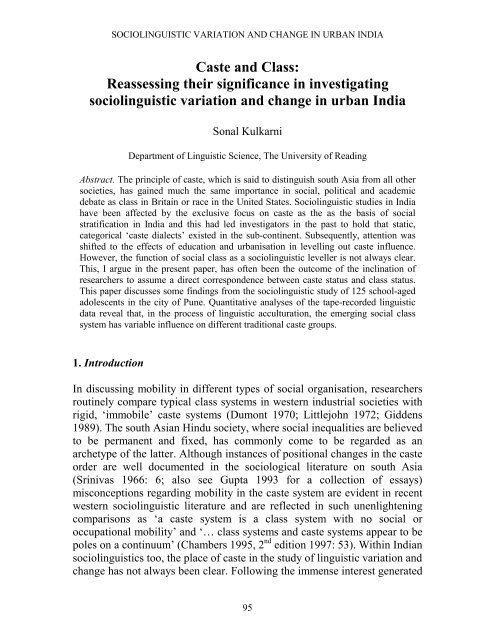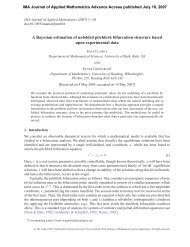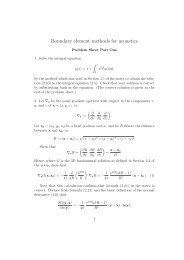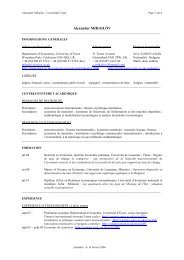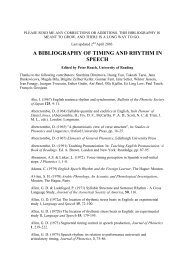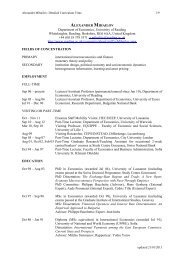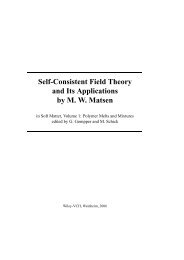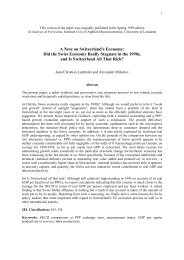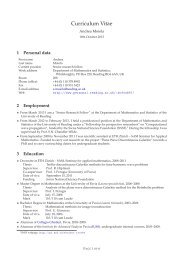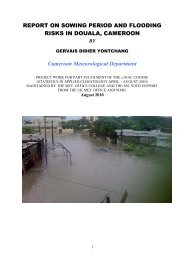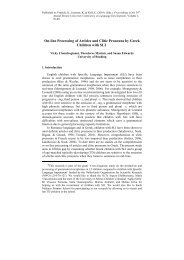Reading Working Papers in Linguistics 4 (2000) - The University of ...
Reading Working Papers in Linguistics 4 (2000) - The University of ...
Reading Working Papers in Linguistics 4 (2000) - The University of ...
You also want an ePaper? Increase the reach of your titles
YUMPU automatically turns print PDFs into web optimized ePapers that Google loves.
SOCIOLINGUISTIC VARIATION AND CHANGE IN URBAN INDIA<br />
Caste and Class:<br />
Reassess<strong>in</strong>g their significance <strong>in</strong> <strong>in</strong>vestigat<strong>in</strong>g<br />
sociol<strong>in</strong>guistic variation and change <strong>in</strong> urban India<br />
Sonal Kulkarni<br />
Department <strong>of</strong> L<strong>in</strong>guistic Science, <strong>The</strong> <strong>University</strong> <strong>of</strong> <strong>Read<strong>in</strong>g</strong><br />
Abstract. <strong>The</strong> pr<strong>in</strong>ciple <strong>of</strong> caste, which is said to dist<strong>in</strong>guish south Asia from all other<br />
societies, has ga<strong>in</strong>ed much the same importance <strong>in</strong> social, political and academic<br />
debate as class <strong>in</strong> Brita<strong>in</strong> or race <strong>in</strong> the United States. Sociol<strong>in</strong>guistic studies <strong>in</strong> India<br />
have been affected by the exclusive focus on caste as the as the basis <strong>of</strong> social<br />
stratification <strong>in</strong> India and this had led <strong>in</strong>vestigators <strong>in</strong> the past to hold that static,<br />
categorical ‘caste dialects’ existed <strong>in</strong> the sub-cont<strong>in</strong>ent. Subsequently, attention was<br />
shifted to the effects <strong>of</strong> education and urbanisation <strong>in</strong> levell<strong>in</strong>g out caste <strong>in</strong>fluence.<br />
However, the function <strong>of</strong> social class as a sociol<strong>in</strong>guistic leveller is not always clear.<br />
This, I argue <strong>in</strong> the present paper, has <strong>of</strong>ten been the outcome <strong>of</strong> the <strong>in</strong>cl<strong>in</strong>ation <strong>of</strong><br />
researchers to assume a direct correspondence between caste status and class status.<br />
This paper discusses some f<strong>in</strong>d<strong>in</strong>gs from the sociol<strong>in</strong>guistic study <strong>of</strong> 125 school-aged<br />
adolescents <strong>in</strong> the city <strong>of</strong> Pune. Quantitative analyses <strong>of</strong> the tape-recorded l<strong>in</strong>guistic<br />
data reveal that, <strong>in</strong> the process <strong>of</strong> l<strong>in</strong>guistic acculturation, the emerg<strong>in</strong>g social class<br />
system has variable <strong>in</strong>fluence on different traditional caste groups.<br />
1. Introduction<br />
In discuss<strong>in</strong>g mobility <strong>in</strong> different types <strong>of</strong> social organisation, researchers<br />
rout<strong>in</strong>ely compare typical class systems <strong>in</strong> western <strong>in</strong>dustrial societies with<br />
rigid, ‘immobile’ caste systems (Dumont 1970; Littlejohn 1972; Giddens<br />
1989). <strong>The</strong> south Asian H<strong>in</strong>du society, where social <strong>in</strong>equalities are believed<br />
to be permanent and fixed, has commonly come to be regarded as an<br />
archetype <strong>of</strong> the latter. Although <strong>in</strong>stances <strong>of</strong> positional changes <strong>in</strong> the caste<br />
order are well documented <strong>in</strong> the sociological literature on south Asia<br />
(Sr<strong>in</strong>ivas 1966: 6; also see Gupta 1993 for a collection <strong>of</strong> essays)<br />
misconceptions regard<strong>in</strong>g mobility <strong>in</strong> the caste system are evident <strong>in</strong> recent<br />
western sociol<strong>in</strong>guistic literature and are reflected <strong>in</strong> such unenlighten<strong>in</strong>g<br />
comparisons as ‘a caste system is a class system with no social or<br />
occupational mobility’ and ‘… class systems and caste systems appear to be<br />
poles on a cont<strong>in</strong>uum’ (Chambers 1995, 2 nd edition 1997: 53). With<strong>in</strong> Indian<br />
sociol<strong>in</strong>guistics too, the place <strong>of</strong> caste <strong>in</strong> the study <strong>of</strong> l<strong>in</strong>guistic variation and<br />
change has not always been clear. Follow<strong>in</strong>g the immense <strong>in</strong>terest generated<br />
95


